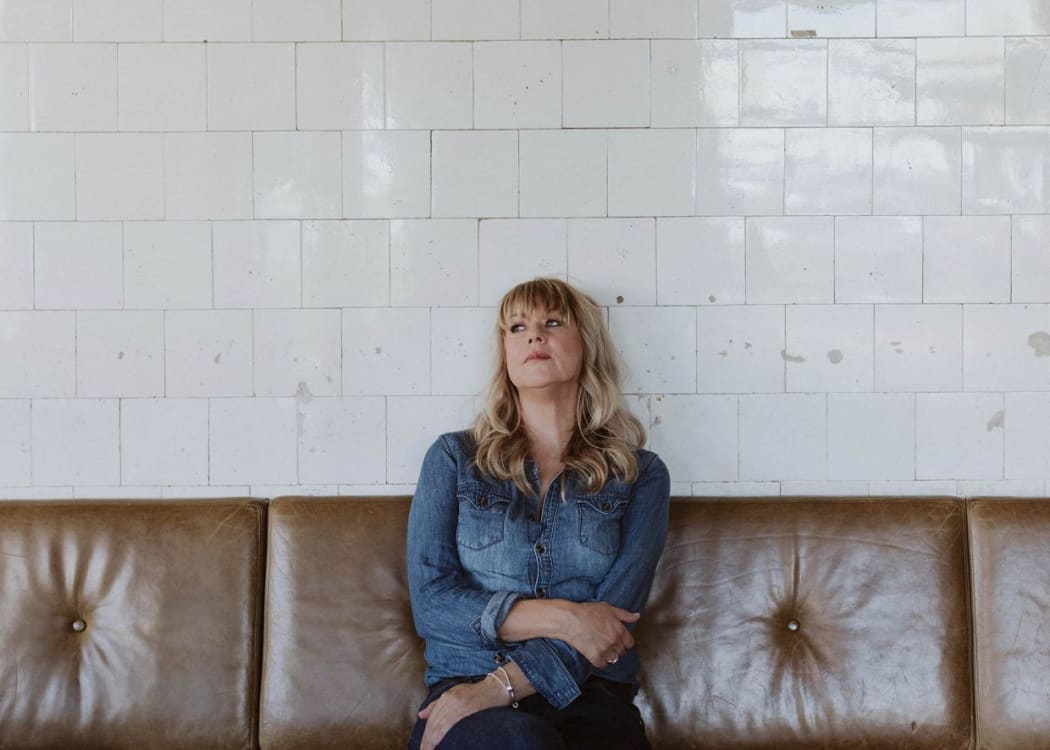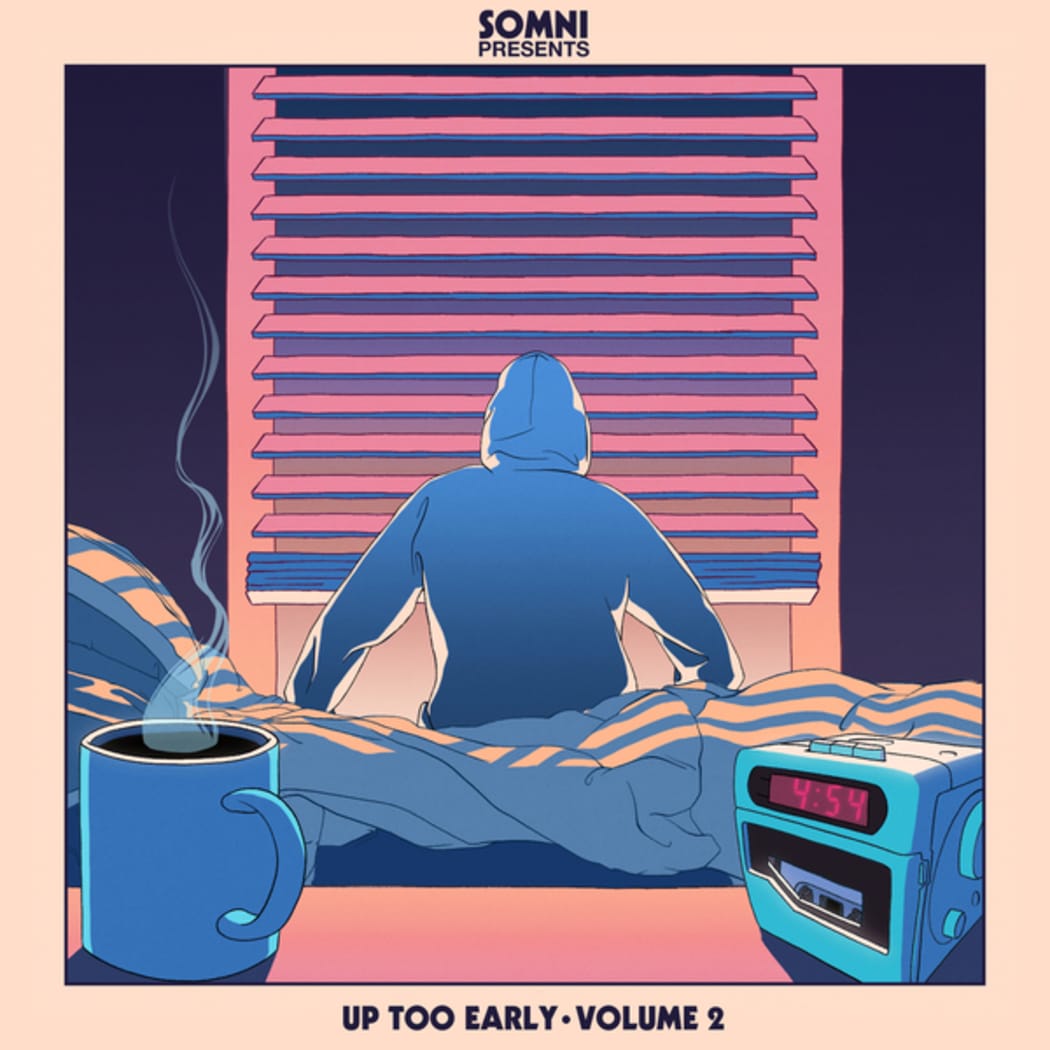Tony Stamp absorbs a posthumous release from Auckland musician Reuben Winter, the first solo album by The Bads' Dianne Swann, and a collection of laidback beats designed for the early hours of the morning.
III by Milk

Reuben Winter memorial on Karangahape Rd Photo: supplied
Reuben Samuel Winter (Waitaha / Kāi Tahu / Te Aupōuri / Te Rarawa / Ngāti Kuri) was an Auckland-based musician who, prior to his death last year, was one of the country's most fearless, prolific artists.
He played in the bands ROIDZ, Bandicoot, Caroles, and contributed to many more, but was best known for two projects - his exploratory electronic alias Totems, where he dabbled in any genre that took his fancy (from ambient to jungle to footwork), and Milk, a guitar-based project which also started as a solo endeavour, but wound up including a roster of guest musicians.
Winter was twenty six when he died, and left behind a huge body of work, and that becomes more impressive when you consider he had fibromyalgia, which sometimes left him too fatigued or in pain to make music.
He died by suicide in September last year, and tributes from Aotearoa’s music community rang out quickly, and made it clear that Winter wasn’t just incredibly talented, but also a great human being who was much loved.
Flying Nun Records have released the posthumous Milk album III, and the label has specified a few things. For one, the record was completed by Winter prior to his passing, and for another, they say it’s not the last thing he recorded.
Whether any more of his music will see the light of day is unclear, but if not III is an incredible final statement, and although this music does contain darkness, it’s not defined by it. In fact for the most part it’s shot through with enthusiasm and joy.
‘Dopehead’ opens the album with a literal whoop, Winter’s zest for music spilling out onto tape. Barely a minute has passed and he’s whipped through several riffs and flirted with several genres, before the back half of the track sees JY Lee from Yoko Zuna enter on sax and things get quite proggy.
It’s hard to pin down influences on III. It’s safe to assume that Winter was as voracious a music consumer as he was a creator, and what emerges feels more than anything like a celebration of guitars, and being in a band.
He was joined on this album by Lachlan Smith on bass and James Thorrington on drums. The track 'Crit+' starts things off in an electronic kind of Krautrock direction, before the other band members join in and it explodes into pop punk.
There’s a real attention paid to sonics here, and in terms of fidelity, this might be the clearest Winter’s guitar music has sounded. The album was mostly recorded at Red Bull Studios in Auckland by Ben Lawson, and mixed by Winter, and the palette of sounds they assembled is always interesting. The guitar parts alone run through numerous timbres over the course of each song.
‘Stolen Valor’ is dreamy and sparse for half its run time, then switches from clean finger picking to distorted chugging. Likewise ‘Maple’ starts mellow prior to its crunchy chorus.
On my first few listens to III I think I took Winter’s voice a bit for granted, but it’s as malleable as his songwriting, easily shifting from a near-whisper to a slightly bratty punk sneer.
Given the circumstances it’s hard not to latch onto lyrics like “I lost all my friends and I’m out all alone”, which is what I think Winter sings in 'Maple's chorus. But every tribute to his life and legacy that I’ve seen has made it clear that he was rich in friends and full of warmth.
Flying Nun is releasing III digitally and on vinyl, with all proceeds split between Fibromyalgia Aotearoa New Zealand and Winter’s whānau and future fund.
The PR for the album celebrates him for “leading the charge of weirdness from the vanguard of the New Zealand underground”. It’s obviously unspeakably sad when someone so young dies, but Reuben Winter has left behind a formidable collection of music, including this great album, that I hope is of some comfort to his friends and whānau.
Need to Talk? Free call or text 1737 any time to speak to a trained counsellor, for any reason.
Lifeline: 0800 543 354 or text HELP to 4357
Suicide Crisis Helpline: 0508 828 865 / 0508 TAUTOKO (24/7). This is a service for people who may be thinking about suicide, or those who are concerned about family or friends.
Depression Helpline: 0800 111 757 (24/7) or text 4202
Samaritans: 0800 726 666 (24/7)
Youthline: 0800 376 633 (24/7) or free text 234 (8am-12am), or email talk@youthline.co.nz
What's Up: online chat (3pm-10pm) or 0800 WHATSUP / 0800 9428 787 helpline (12pm-10pm weekdays, 3pm-11pm weekends)
Kidsline (ages 5-18): 0800 543 754 (24/7)
Rural Support Trust Helpline: 0800 787 254
Healthline: 0800 611 116
Rainbow Youth: (09) 376 4155
If it is an emergency and you feel like you or someone else is at risk, call 111.
The War on Peace of Mind by Dianne Swan

Dianne Swann Photo: supplied
The name Dianne Swann should be familiar by now to RNZ listeners. You might know her as a music critic on Afternoons with Jesse Mulligan, or maybe from the group When The Cat’s Away, which she was part of in the 1980s, or from the act she fronted called Everything That Flies. There was also The Julie Dolphin, the band she formed with Mockers guitarist Bret Adams, who she continued working with in The Bads, a name formed from the initials of their names.
Swann released a song called ‘Something Good’ in 1989, and that was her only solo music until the string of singles that preceded her new album The War on Peace of Mind. It’s shot through with some of The Bads' alt-country style, but that group always pushed themselves stylistically, and this is no different.
Each of the eight songs here sound meticulously crafted, and it’s testament to Swann’s storied career that they each contain moments evoking classic pop songs of the past. The type that sound familiar straight away, without feeling derivative.
If you’ve heard Swann on RNZ you’ll know she’s quite softly spoken, and that extends to her singing, no matter how dramatic the music is - like the bluesy bluster of 'Reel You In'. She’ll sometimes dip into a wee snarl, but generally the mode of operation is pretty zen, as if she were the calm at the centre of the storm.
That’s not to diminish her voice of course. She tackles tricky melodies like the one on 'The Cynic' with ease, swooping in and out of a falsetto and complementing the overall sunny vibe.
Lyrically that one seems to deal with an acquaintance who’s a bit negative. The verses grapple with their perspective, and then in the chorus Swann lets her own opinion be heard. “Everybody needs love and understanding” is a broad statement, but following it with “everybody’s grieving” is deceptively perceptive. It made me think about how we each carry around the people we’ve lost, but don’t often acknowledge it.
There’s another plea for empathy on the deeply romantic 'Show Your Heart', the sort of song that shuns any cynicism, and like many of these tracks, I think reveals the sort of person Swann actually is.
Things do head in a slightly darker direction on the final two tracks, and I think that’s by design. It’s telling that the album is called The War on Peace of Mind, and the penultimate track is ‘Losing the War on Peace of Mind’. That said, it’s a zesty, Beatles-inspired number, featuring a heck of a violin hook.
The album finishes with 'Rare Good Feeling', and I feel like that first word is quite revealing. But Swann goes on to say she wants to share that good feeling with everyone. It’s also a masterstroke to finish on the album’s rowdiest song, one that channels Stooges-type guitar raunch.
The list of musicians whose career started in the 1980s and are still going to this day is a comparatively short one, and going through Dianne Swann’s career, there are many impressive high points along the way.
But I’m mostly impressed by her generosity of spirit, and she comes across on The War on Peace of Mind as less concerned about herself than the world in general. The album finishes on her spoken voice, which I also think is an inspired decision - pulling back the curtain even more on a musician who’s already generously transparent.
Somni Presents: Up Too Early Volume 2
The Los Angeles beat scene began in the 2010s. These things are hard to pin down, but consensus seems to be that the producer Flying Lotus was key to its inception - both in his music, which took the pioneering beatmaking of J Dilla and Madlib and pushed it into more psychedelic realms, and by starting a label called Brainfeeder, which gave a home to a bunch of like-minded musical explorers.
The scene naturally splintered into different sonic realms, and two producers in particular honed in on the mellower side of the template. In 2011 a 21 yr old called Shlohmo made an album called Bad Vibes, an epic in miniature which seemed to focus on making itself as intimate as possible. Around the same time Brainfeeder signee Teebs was dabbling in a similar musical genepool, taking fragments of delicate tones and surrounding them with petite percussion.
I’m a big fan of all these artists, but I hadn’t really grasped that, ten years on, they’ve gone on to inspire a whole other generation of bedroom beatmakers.
One of those is called Somni. His real name is Leo Shulman, and while he was born in Hampshire Sth East England, he’s since moved to the birthplace of the music he’s clearly emulating: LA.
There's a new Somni-curated collection called Up Too Early Volume 2. The idea behind the series is music to listen to when you’ve woken up around 4am and can’t get back to sleep - quite a specific framing - and while Volume 1 cast its net slightly wider when rounding up a collection of mellow electronica, Somni has gathered a roster of producers on a very similar page - himself among them.
There’s obviously a precedent for this type of chillout music - think of the Cafe Del Mar series in the 90s among many others - but Somni’s music has a whole host of signifiers that are LA beat specific. There’s the sluggish tempo, the huge bottom end, the way everything cuts out when the kick drums hits, but everything above that operates at maximum delicacy - layers of tape hiss, homemade percussion, and acoustic guitars.
On Joe Nora's contribution - the appropriately named Time Alone - I particularly like the way he seems to have made a rhythm track out of something that sounds like gravel. Using whatever’s to hand as percussion is a common attribute of this music, and I like it because it shuns any sort of pomposity. You feel like you’ve been welcomed into these guys’ apartments (or in this case, possibly backyard).
'Dusk' by Somni features a noise track that seems to have come from Shulman randomly throwing up a microphone. You can hear slivers of birdsong and distant conversation, but it's mostly the sound of an absence of things. It grounds everything, and makes clear that we’re outside the sterile confines of a recording studio.
It also features live guitar and bass, something I identify with Shlohmo, who avoids samples in favour of live playing. There’s an effort to shun hallmarks of electronic music like quantisation, following in the footsteps of J Dilla who in his later work just let everything be slightly out of time, and all the more human for it. Mostly what identifies this as separate from, say, a band, is the colossal, artificial kick drum.
Shrimpnose is a guy who started his career selling beats to rappers, but seems to have embraced acoustic guitar as a sound source. On his track 'Daylight' he distorts it, warps it and reverses it, layering track upon track to calming effect.
This is music that’s clearly aiming to soothe, and I like the idea of it existing in the space between waking and sleep. Things are at their busiest on 'On Some Moon' by Omari Jazz - a cluster of wooden clicks, water sounds, acoustics, and a vocal from Meridian, before the entry of an unexpected (and gorgeous), string section.
Music like this often feels like the soundtrack to my subconscious, as if someone's dropped a mic into the back of my mind. It really does relax me, but I also understand that to some it’ll just be wallpaper. To those people I suggest this - the next time you wake up a few hours before you need to, pop on Up Too Early Volume 2, and let yourself really focus on the details. You might find, like me, that it’s deeply human, and often comforting. And aside from that, it’s just very chill.

Up Too Early Vol 2 cover Photo: supplied
RELATED:

